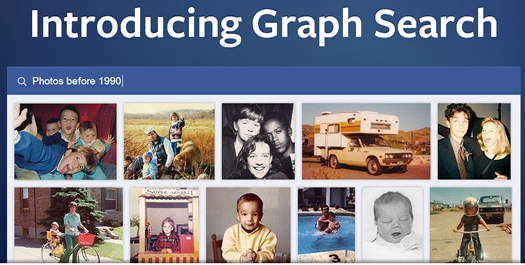
Last week, Facebook unveiled Facebook Graph Search, which is an important step forward for the social network. Many in digital marketing, including myself, wondered why Facebook had never added a serious search feature to its platform. It made no sense… Until now, Facebook’s search functionality has been horrible. I often joked that you couldn’t find yourself via Facebook search… :)
By the way, I also wrote a post in October titled “BeastRank”, after Mark Zuckerberg hinted at a Facebook Search Engine. You should check out that post to find out the various ways that Facebook could rank its social search results (based on the enormous amount of data it knows about all of us).
Now that Graph Search has arrived, Facebook finally has the opportunity to better monetize its massive user-base (eventually). Note, Graph search is only in an early form and will absolutely evolve over time. And no, it is not being monetized yet. But you better believe that’s in the works.
What I’m Going to Cover
Facebook Graph Search is definitely an interesting take on social search. I’ve been testing it heavily over the past few days and will cover several of my findings in the post below. You can currently search for people, places, photos, and interests, and I dug into those areas in detail over the past few days.
Note, I’m not going to cover Graph Search basic functionality, or a tutorial on how to use the new search features. There are plenty of posts covering the basics. Instead, I’m going to cover certain aspects of Graph Search that relate to privacy, adoption, SEO, speed, etc. Let’s jump in.
Autocomplete and the Facebook Graph Search Funnel
Once you start using Graph Search, you’ll notice that there are autocomplete suggestions as you start to type. These are essential for Facebook, since it’s not 100% intuitive how you are supposed to structure queries using Graph Search. All of us are used to Google, where you can basically enter anything and have the search engine return results in seconds. I found myself wanting to enter the exact triggers that would surface the right Facebook data. That could be a challenge for Facebook.
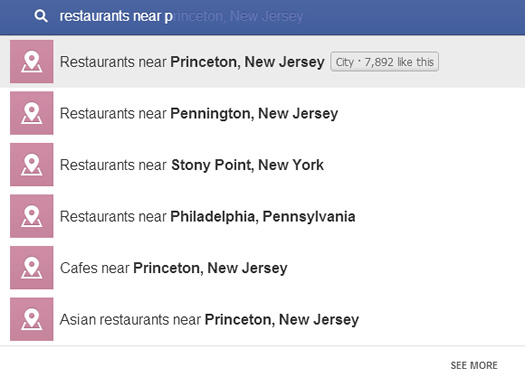
If you perform a search that would trigger Graph Search results, then Facebook will offer its guidance. For example “Restaurants in {location}” will auto-populate with locations based on your profile, and will include the Graph Search icon for restaurants next to the suggestion. If you search outside of Graph Search, Bing’s autocomplete takes over (since Bing provides backup for Graph Search).
![]()
After performing hundreds of searches over the past few days, I found that Facebook definitely helps you out and starts to rework your searches to fit the Graph Search lingo. For example, if you simply enter a location and restaurants, Graph Search changes that to the “Restaurants in {location}” format. I think the average person might be confused with what they can search for, and how to best surface the information. I know I found it a little confusing, and I’m neck deep in search… That makes me think my mom will have no idea what she is doing. :)
Speed is Important, and Delays Matter
One thing I noticed is that the speed that Facebook returned the results lagged sometimes. And when you are used to a fraction of a second with Google, a few seconds (or longer) felt like a lifetime. I think it’s just another example of how we take Google for granted. If you spend some time in front of Graph Search, I think you’ll appreciate the speed at which Google moves (and for extremely advanced queries).
There were several times that Facebook just hung after I conducted search… I literally viewed a blank screen for a while until the results were returned. Again, this will kill the user experience for Facebook Search, who will undoubtedly leave for Google’s near-instant results.
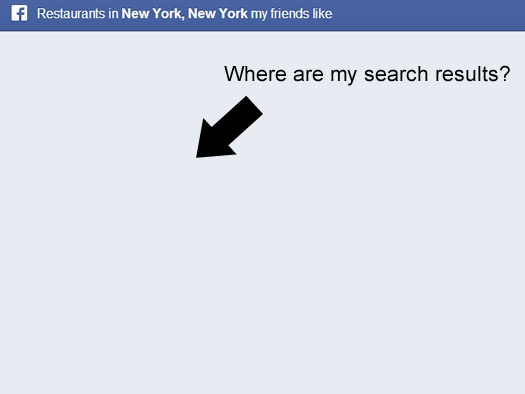
Local Graph Search – Places, Restaurants, etc.
I found place search pretty cool, but often ran into situations where Facebook didn’t have enough data to provide thorough results. Just a straight search for “Restaurants near Princeton” returned some good results (along with social annotations). I saw a lot of my favorites on the list, but I didn’t need Facebook to know them… There’s a big difference right now between Graph Search and just using Yelp’s app on my phone. Yelp has a ton of data, reviews, etc. Graph Search seems lacking certain areas, and especially outside of the core categories like Restaurants.
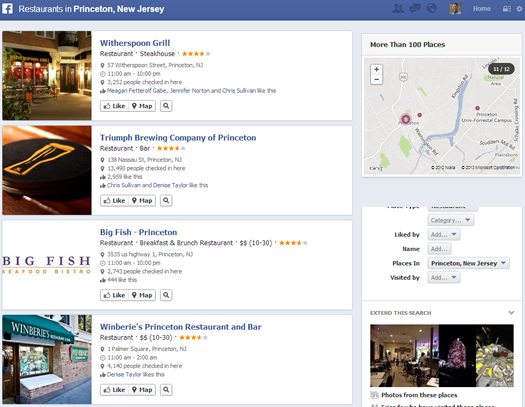
If I searched for “restaurants liked by my friends”, I started to see some results that were interesting. I just might want to take a closer look at several of those restaurants. And that is the power of Graph Search, if it can consistently provide recommendations based on my friends’ data. But, there needs to be enough data, and that information needs to be helpful. That’s different than simply returning restaurants that my friends “liked”.
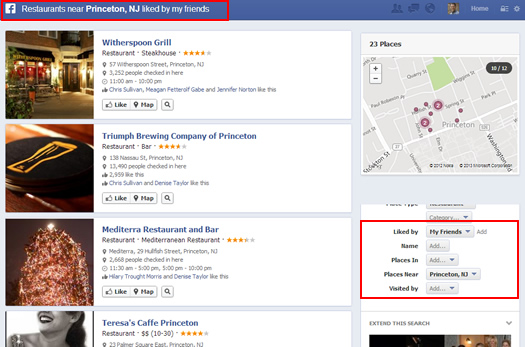
From the results page, I can like the restaurant, view it on a map, view photos taken by people, and also view visitors of the restaurant. This is where some privacy concerns popped up… Good segue.
Places and Privacy (Photos and Visitors)
When you click “photos in” from the local search results page, you will see all photos taken at the restaurant (or place). By the way, almost all of those photos are from people I don’t know, I’m not friends with, etc. Sure, the photos were shared publicly, but I couldn’t help but question if those people even knew the photos were shared publicly. And now the photos are available to anyone searching Facebook (via Graph Search).
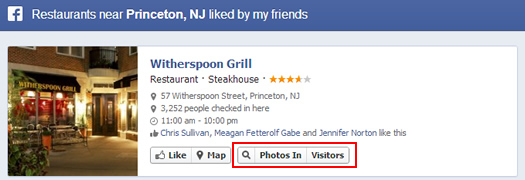
For some restaurants, there were hundreds of photos of people and I could easily see their names, click through to their profiles, like their photo (creepy), view comments and likes, etc. Again, I’m not sure all of those people understand this is happening. Oh yeah, there were many photos of kids too… Way to go parents. You just posted public photos of your kids for the world to see. Ugh.

Visitors and Privacy
If I click “Visitors” when viewing a list of restaurants, Facebook will show me people that visited the restaurant (via check-ins). On that page, I can add them as a friend, message them (creepy), or view their photos, friends, and interests. There is also a faceted navigation that lets me drill into visitors by employer, city, school, hometown, etc. Yes, even more concern over privacy here.
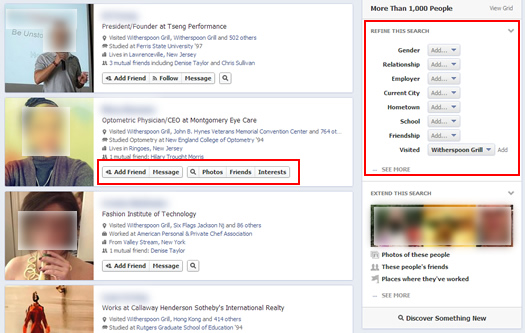
Faceted Navigation, Graph Search-Style
When using Graph Search, you can often drill deeper into the search results via a faceted navigation. For example, when you search for a place, the navigation is present by default and enables you to fine-tune your search. When I searched for, “Restaurants near Princeton my friends like”, the faceted navigation enables me to choose other types of places like bars, hotels, gyms, parks, etc.
I can also choose which friends I want to focus on (if I know certain friends like similar things). I can also change the location, select “visited by” and then choose a friend.
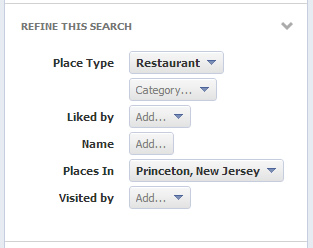
Cool, But How Many Will Use The Faceted Navigation?
If you like shopping online and enjoy using a faceted navigation to refine your searches, then you’ll like this functionality. I definitely found it useful and quickly began digging into more Facebook data. That said, I’m not sure how many people will use it like I did… When you think of the average user (who is spoiled by Google doing everything for them), they might not want to refine their searches. They might expect Graph Search to be smart enough to refine it for them. Time will tell how many people use the faceted navigation in Graph Search.
Online Reputation Management (ORM) and Graph Search
I’ve worked on a lot of online reputation management projects over the years, so I started to dig into that aspect of Graph Search. If you type someone’s name, autocomplete first tries to display your friends’ names. But as you select a friends’ name or complete their name in the search bar, the autocomplete suggestions focus entirely on that person. You’ll see “friends of”, “photos of”, etc.
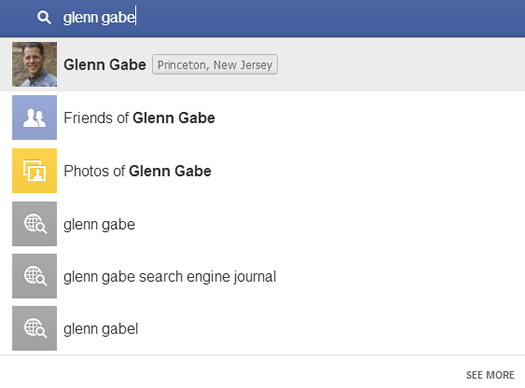
“See more”, and I mean more…
So, Graph Search provides autocomplete suggestions for specific people, but what happens when you click the “see more” link at the bottom of autocomplete? Well, when you click the “see more” link, autocomplete suggestions prompt you to search for all sorts of interests from the person in question. That includes music, sports, pages, books, groups, apps, etc.
That’s cool, but what’s that further down the list? Oh, religious views and political views! “Danger, Will Robinson!” At some point in your life, you learn that politics and religion are extremely polarizing topics. Well, how about if the world could easily drill into that data about you? Using Graph Search, they potentially could…
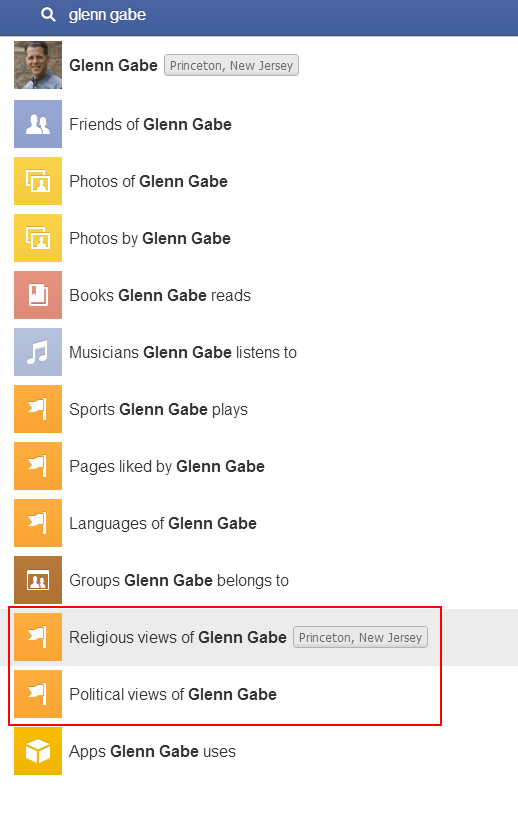
So, if you don’t have your privacy settings set up correctly, the world can now view your political and religious affiliations. If you’re cool with that, fine. If you just fell out of your seat in horror, then go make changes now. :) And to make drilling into the data even easier, there’s a nice dropdown on the page that enables me to find out the religious and political affiliations of any of my friends.
Graph Search and “Not Provided” – Hiding the Referrer
As I mentioned earlier, Graph Search falls back to Bing’s search results when it can’t meet a certain query. But how does that data get passed to the destination site? Will we begin to see searches from Graph Search in our analytics packages, and can we view the keywords people are searching for? That would be logical, right? I mean what kind of search engine would hide keywords from webmasters?? :)
Well, you aren’t going to be happy with the answer. I checked the referrer leading from Facebook Graph Search to websites, and it unfortunately looks like any other visit from Facebook. So I guess we have our own version of “not provided” from Graph Search. :) Come on Facebook! Pass the query along in the referrer… SEO’s will love you for it. Until they change that, you will see a standard referral from Facebook even when that person used Graph Search.
Click the image below to see a larger version of the referrer:
It’s worth noting that Facebook Graph Search almost always keeps you within Facebook. It’s only when the results fall back to Bing that you get standard search results that take you off the site. That’s when I think Facebook should send the referrer.
Summary – Pay Attention to the Details
Graph Search is big news, even if this beginning state isn’t perfect. Sponsored results (advertising) can turn into a lot of revenue for Facebook, as long as the search experience is strong and the results are compelling. But since it’s social in nature, and based on our data, Facebook has to be really careful with privacy. Based on my research so far, I wouldn’t give Graph Search outstanding scores on that front. In addition, the user experience needs to be faster, and improve, in order to meet the Google standard. Sure, it’s a new twist on search, but Facebook can’t take a step back with performance.
Needless to say, I’m eager to see how Graph Search evolves. And I’ll be closely watching adoption, user experience, privacy, the quality of the search results, etc. I’ll be writing more posts on the subject in the coming months, so definitely check back often. Now excuse me while I find a Chinese restaurant near Princeton that my friends like. :)
GG


Hmmm… very meaty post and i’m interested to test it but just have to wait for beta approval I guess, but yes I think the privacy issues raised are going to be compounded as Facebook will be doing more data matching and predictive analytics to push the results in front of you when in the past photo overshares might have only be found coincidently…
I could see this changing SEO in a big way if Bing allows this to be done directly from it’s search omnibox or from within Internet Explorer address bar, once they manage to deal with the performance lags… unless your fans have liked your official page you might not be shown in top few matched results..
I could imagine it could also shift how people may start using Facebook, I could imagine the following occurring soon…
1) I type the name of my restaurant and it suggests me which friends might want to join me… based on time of day, their latest status update, are they nearby and any previous photos tagged at that venue
2) I type in the title of a movie, it suggests which friends may also want to see it and also recommend a suitable theatre close to both of us or one we have checked into before along with a link to buy tickets and share purchase with this group of suggested friends
But a lot of this is dependant on them getting all 1 billion users onboard, dealing with multi-lingual queries and getting instant answers back to users…
Why David :) I think you are expecting a lot from FB programming which so far took 8 years and had to use 1990’s drop downs to get this going,,, wouldn’t expect a lot of semantic search from them til about 2020 and beyond by which time someone smart will have realized just because you have the largest group of users doesn’t mean you are unbeatable – that the scores like trust and satisfaction make your prime for disruption – they will taken their user base and Facebook will be a company where we will say remember when we used to…. #prediction ;)
Nice article Glenn!
So true regarding how long this took, and how long it could take to improve. In theory, there are many interesting things FB could do with Graph Search, but they all come close to crossing the line privacy-wise. Heck, some features clearly cross the line now… It should be interesting to see how this goes.
Great points David. I agree that there is so much Facebook could do with Graph Search… and I covered a lot of that in my BeastRank post on SEJ. But you’re right on several levels regarding performance, adoption, user data, etc. I tested hundreds of queries since Friday and the results were sometimes lacking (and I’m being nice).
In addition, there were some serious performance issues. We are so used to Google’s split second results, that I think many will become frustrated… and jump back to Google anyway. They need to boost performance, and quickly…
The privacy issues are potentially huge. Again, I came across many examples of photos that were “public” but that probably shouldn’t have been. I think FB is going to here about that from furious users.
:)
David is right, a helpfully meaty post. I think the privacy issues you touched on are going to catch a few people off guard. Be interesting to see if that causes a stink.
Thanks for your comment Bill. And yes, I think you’re right about the privacy issues. I think many people are unaware how much of their data has been shared publicly. I’m sure that’s one reason that Facebook is rolling out Graph Search so slowly. They want to gauge how much pushback they get. :)
One difference between Google and Facebook searches is that while Google search sits on the internet infrastructure directly which is mostly standard and simple, Facebook has its own layer to deal with, making speed and scope limited.
Also, from the beginning Google is focussed on search as its core while for Facebook its an add-on, important but not the core function. People will still come mainly for the social element. How search influences this will be critical for Facebook.
The privacy issues are a factor in this. They will probably need to add a layer i.e. make public but not searchable. Else, the bad publicity will be a risk for them as a business.
Thanks for your comment, and you make some good points. Regarding your first point, Google must handle extremely complex websites and applications when crawling and indexing. It’s definitely not simple. And if Facebook wants to take search share from Google, then they have to provide a strong and compelling search product. In my opinion, they need to improve greatly in order to do so.
Second, the revenue implications for Facebook are huge. They don’t generate a lot of revenue now (especially for as many users as they have). Search, if done properly, can provide a serious shot in the arm. But again, performance, privacy, etc. are major challenges for them now.
I really like your idea of providing another privacy layer for Graph Search. It’s amazing what I’ve found by performing searches on Facebook since last Friday. I think many people will be angry, unhappy, etc. And Facebook is going to hear about it.
My facebook graph search not happend now yet